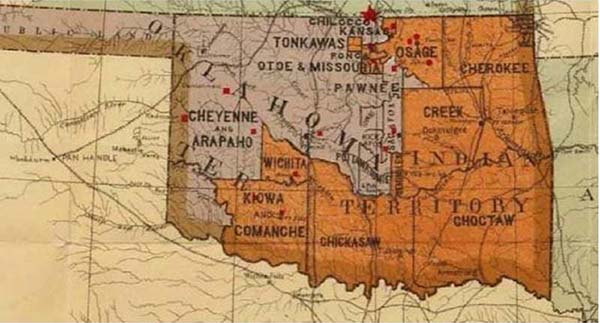
- Details
- By Levi Rickert
Opinion. The U.S. Supreme Court’s 5-4 ruling in McGirt v. Oklahoma on July 9 reaffirmed that Congress never “disestablished” the 1866 boundaries of the Muscogee (Creek) Nation, which encompasses three million acres in eastern Oklahoma and includes most of the city of Tulsa.
The U.S. Supreme Court’s 5-4 ruling in McGirt v. Oklahoma on July 9 reaffirmed that Congress never “disestablished” the 1866 boundaries of the Muscogee (Creek) Nation, which encompasses three million acres in eastern Oklahoma and includes most of the city of Tulsa.
On the evening news, ABC’s David Muir said it was “the most significant ruling for Native Americans in decades.”
Some people erroneously jumped to the conclusion that ownership of the three million acres was converted to tribal control. The historic court decision was about legal jurisdiction. So no: the Creek Nation will not be collecting property taxes on the land in eastern Oklahoma.
American Indian legal scholar Stacy L. Leeds (Cherokee), who is Vice Chancellor for Economic Development, Dean Emeritus and professor of law at the University of Arkansas wrote for Slate magazine a day after the decision, “the court noted that Oklahoma repeatedly overstepped and stretched its governmental powers beyond what federal law provides. In short, Oklahoma has no legal authority to prosecute Native Americans for crimes committed within an Indian reservation. Oklahoma spent a century actively creating a law on the ground that was contrary to the law on the books.”
One week later, on Thursday, July 16, the Oklahoma Attorney General and Five Civilized Tribes —Cherokee, Chickasaw, Choctaw, Muscogee (Creek) and Seminole— announced an agreement-in-principle to address how criminal and civil legal matters will be handled in the state in the post-McGirt era.
To even casual Indian Country observers, striking a deal within one week seemed unimaginable because they know the wheels of tribal government tend to move slowly. Less than 24 hours after the agreement-in-principle was announced, Muscogee (Creek) Nation Principal Chief David Hill and Seminole Nation Chief Greg P. Chilcoat, said they are not in support of the agreement.
From all appearances, it seems as if the state of Oklahoma sought to retain the legal authority over tribal matters it should have never had. Native News Online emailed the Oklahoma Attorney General to ask who signed off for each tribe and has yet to receive a response.
The agreement-in-principle set off backlash among Oklahoma tribal citizens and throughout Indian Country because it appeared the participating tribes were handing back the sovereignty reaffirmed by the Supreme Court back to the state of Oklahoma on a silver platter.
One key component of the agreement-in-principle is the fear that the state of Oklahoma is pressing Congress to pass a law limiting tribal civil jurisdiction over non-Indians to only those situations where the non-Indian has a “consensual relationship, such as contracts” with the nation, according to Suzan Harjo (Cheyenne, Muscogee), a former National Congress of American Indians executive director.
“This mirrors language from the Supreme Court’s 1981 Montana v. United States, which has proven harmful for Native nations, given that non-Indian violent perpetrators have repeatedly used the Montana decision to argue that tribal courts do not have jurisdiction to issue civil protective orders against non-Indian perpetrators because they did not ‘consent’ in a contract to tribal civil jurisdiction,” Harjo said.
The thought process was, of course, Oklahoma officials want to retain control over American Indians.
The skepticism was justified.
Seeking to protect the pre-McGirt decision status quo, John A. Wright, Tulsa county assessor, on Friday penned an op-ed for Tulsa World titled, “Tribes should remove doubt from the marketplace and ask Congress to dissolve reservations.”
The first sentence he wrote was a dead giveaway where he was going: “The Native American tribes, if acting in the best interest of their people, should realize the market likes as few unknowns as possible.” As if Oklahoma Native people have not had to worry about the “unknowns” of subjugation for more than a century.
Oklahoma Gov. Kevin Stitt formed a 10-person commission to recommend to the U.S. Congress the best path forward post-McGirt. The commission is composed of eight men, three oil and gas executives, two former members of Congress and a wife of a former congressman.
This same governor is the same Oklahoma governor the Cherokee, Chickasaw and Choctaw Nations filed a lawsuit against on Dec. 31, 2019 in federal court over tribal gaming compacts.
Should the Five Tribes trust the Oklahoma officials? Absolutely not.
However, inter-governmental agreements are important for tribes, but should be negotiated in good faith and never allow for the watering down of tribal sovereignty, especially in matters relating to non-Indians perpetrating crimes against Native women.
More Stories Like This
When Journalism Is Treated as a Crime, Democracy Is in DangerDisrupting Poverty Through Opportunity
Marmot Day (Ground Hog Day) and the (Lack of) Law
Sanctuary Cities Under Siege: When Federal Power Becomes a Weapon Against the People
Denmark's Genocidal Practices in Greenland
Help us defend tribal sovereignty.
At Native News Online, our mission is rooted in telling the stories that strengthen sovereignty and uplift Indigenous voices — not just at year’s end, but every single day.
Because of your generosity last year, we were able to keep our reporters on the ground in tribal communities, at national gatherings and in the halls of Congress — covering the issues that matter most to Indian Country: sovereignty, culture, education, health and economic opportunity.
That support sustained us through a tough year in 2025. Now, as we look to the year ahead, we need your help right now to ensure warrior journalism remains strong — reporting that defends tribal sovereignty, amplifies Native truth, and holds power accountable.
 The stakes couldn't be higher. Your support keeps Native voices heard, Native stories told and Native sovereignty defended.
The stakes couldn't be higher. Your support keeps Native voices heard, Native stories told and Native sovereignty defended.
Stand with Warrior Journalism today.
Levi Rickert (Potawatomi), Editor & Publisher

